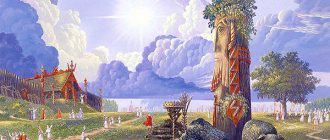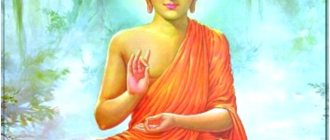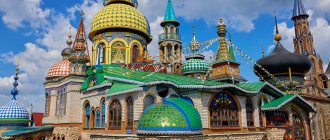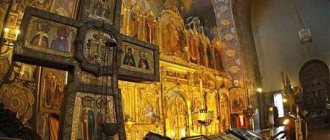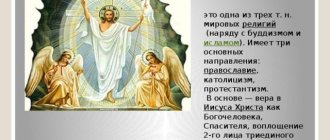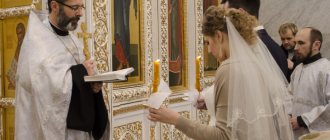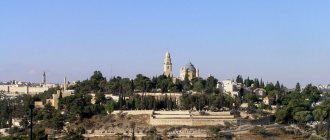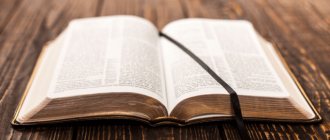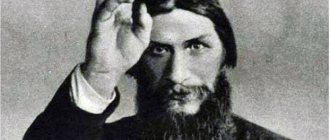Who are Baptists? Baptists are Protestant Christians. The name comes from the Greek word words
“βάπτισμα”, which is baptism from βαπτίζω - “I immerse in water,” that is, “I baptize.” Literally, Baptists are baptized people.
Christianity has many faces, just like the many faces of the people living on earth. Only in the time of Jesus Christ was there no disagreement between people among his followers. Or rather, they were, but Jesus resolved them with his word. Then the time came for Christ to leave the earthly world and ascend to the Father. But Jesus did not leave Christians alone and sent the Holy Spirit, who lives in the hearts of believers. For the first three centuries, Christianity held on. There were no baptisms of children, there were no icons, there were no statues. Christianity was persecuted and was not up to the splendor of the poor wounded church, which kept the faith and the Word of the Lord. Through the centuries the church has carried the undistorted Gospel of the Lord Jesus Christ. God kept his word.
How did the Baptists appear?
But people remain people. People are different from people. And Christianity, spreading across the face of the earth, absorbed the customs and traditions of peoples who believed in Christ, but did not completely abandon their former customs and rituals. And they came up with something that was not in the Bible. In the West, indulgences, a kind of pass to heaven, were sold for money. The Pope was mired in debauchery and burdened himself with secular power. In the east, as well as in the west, the Word of God became far from the language of the people to whom it spoke. Hebrew, Latin and Greek were considered sacred languages; the Russian Orthodox Church won the right to serve in Old Church Slavonic. But he was also incomprehensible to people. People's ignorance and ignorance of God's word allowed the priests to retain the right to read and interpret the scriptures as they pleased, which led to the emergence of something that was not in the Bible. This went on for a long time. Until one monk, having studied the languages in which the Bible was written, decided to resist the desecration of the church. He wrote out as many as 95 outrageous points on which the church departed from the Bible. And he nailed them to the doors of the church, believed to be in Witenberg. He translated the Bible into German. People outraged by the impunity of the official church followed him. Thus began the reformation of the church. Then the Bible was translated into English and French. The state church brutally resisted people's desire to read the Bible in their native language. In each state, churches essentially reminiscent of Baptists arose. in France, they were called Huguenots. Have you heard about St. Bartholomew's Night? 30,000 Protestants were killed for their faith. In England, persecution of Protestants also began.
Baptists in Russia
baptism of Baptists
But everything comes to Russia late. Peter was the first to try to translate the Bible into Russian. But the Pastor who translated the Bible died under mysterious circumstances. And the translation matter was frozen. Alexander the first resumed translation. Several books of the New Testament and several books of the Old Testament were translated. The translation became popular among the people and was banned for fear of shaking the political atmosphere in the country, since the translation of the Bible could lead to people moving away from Orthodoxy, which was the connecting element of Russian statehood. Translation in other countries occurred several centuries ago. For example, Luther, in Germany, translated the Bible in 1521. In 1611 in England it was translated into English by King James. In Russia, translation was not allowed to develop. Alexander II resumed the translation. And only in 1876 the people received the Bible in Russian!!! Friends, please think about these numbers!!! 1876!! It's almost the 20th century!! The people did not know what they believed in! The people did not read the Bible. Keeping people ignorant for so long was stupid and sinful. When people began to read the Bible, Russian Protestants naturally arose. They were not brought from abroad and were first called “Orthodox living according to the gospel,” but they were excommunicated from the church. But they organized themselves into communities and began to be called Evangelical Christians. The evangelical movement grew, people turned to God. And as in other countries, the official church was outraged that someone was pointing out its shortcomings and, with the support of the state, began persecuting Russian Protestants. They were drowned, sent into exile, and imprisoned. It is sad. People who believe in God, no matter what their denomination, should not persecute other Christians who believe in the same God, even if they differ in some ways. In the south of Russia, the evangelical movement is gaining momentum among ordinary people. In the North of Russia - among the intelligentsia. In England, Protestants received the name “Baptists”, from the Greek and English word “baptizo”, “bapize” - which means to baptize. Because one of the differences between Baptists and Orthodox Christians is that Baptists are baptized at a conscious age.
The Truth of Orthodoxy and the Mirages of Baptists
God bless. By the providence of God, for several years I and several of my friends had to be among Protestants, or rather, in the community of Baptists who are members of the ECB SC (Council of Evangelical Christian Baptist Churches). By the mercy of God towards us sinners, we came out of there and joined the one Holy, Catholic and Apostolic Church, the Orthodox Church. And now, having some idea of Protestantism from the inside, I would like to look at it from the point of view of an Orthodox person. You may ask - why? Perhaps my, albeit insignificant, experience will help those who are lost, warn the inexperienced, and sober up the gullible.
First, I would like to explain why I ended up in the Baptist sect. By God's providence, the first person who appeared on my path after I became interested in Christianity was an Orthodox priest, a former therapist. He opened my eyes to many things, explained where to buy a Bible, and offered baptism. But out of my pride and arrogance, I rejected the path of the shepherds, and chose the path of the wise men. This happened because I didn’t believe too much of what he told me. I wanted to find out everything myself.
By the grace of God, at the same time that I bought the Bible, I was “coincidentally” given “The Law of God.” And this helped me acquire some sound concepts about God, faith, and the Bible.
Nowadays there are a lot of people who call themselves Christians. But as it is said: “Not everyone who says to Me: Lord! God! He who does the will of My Father in heaven will enter the Kingdom of Heaven.” This is the whole point - either we accept the will of the Father, or we reject it. Both the Orthodox priest and the “Law of God” clearly indicated to me the will of God, because... the meeting with the priest and receiving the book happened without my will. But, after reading the Gospel, I found a lot of things that, as I thought, did not correspond to the Gospel in Orthodoxy - the pomp of the priests’ clothes, the decoration of churches, icons, rituals, and an incomprehensible language. All this seemed to me the complete opposite of the Gospel.
And I did as the holy Apostle Paul writes in his letter to the Romans. I judged everyone around me instead of judging myself. I applied the gospel standard not to myself, but to others, including the Church, and I justified myself. And now I was looking for like-minded people, those who did the same as me, and they were not slow to appear. It turned out to be a Baptist sect, part of the ECB SC.
The ECB SC is famous for the fact that almost all elders who are responsible for specific communities spent from 1 to 12 years in prison. A high level of external piety - do not smoke, do not drink, do not swear. They call themselves saints and saved. They treat each other and everyone kindly. Constantly studying the Bible. And therefore they claim to be true Christians.
Therefore, when I first came to the community, I looked at the presbyter, at least, as a prophet or apostle. It seemed to me that he saw right through me and read all my thoughts.
The faces of the rest of the community members seemed friendly and clean to me, which was actually the case, because... Baptists do not smoke or drink, and behave friendly towards newcomers.
It took several years to master the biblical text and even comprehend it a little. During this time, I had to study several Protestant textbooks and purchase four different translations of the Gospel into Russian. He spoke many sermons, traveled with groups of missionaries, and visited prisoners in the camp. Everything seemed to be going well. But I was very proud, and therefore in the Protestant community I often got a lot of trouble - the Lord humbled me.
But my friend, through whom I came to the community, and several other people with him unexpectedly went to Orthodoxy. For me it was a knockout blow. But, because these people mostly left, condemning specific people in the community; their departure did not excite me, but confused me. I often asked myself the question: “Am I really more sinful than them, that they see the truth and I don’t?” Today I answer this question like this: “Of course, I was too proud to see the truth.” Moreover, all those who left were baptized in Orthodoxy in childhood, but I was not - this is of great importance.
Having experienced this event hard, I continued to work, although I was often faced with the question of what Orthodoxy is and why my friends went there. I met with them occasionally, wanting to see some new quality in them.
In the community I asked more and more questions about the Gospel - and almost always received answers that did not satiate my soul. After all, the soul can only be satisfied with the truth, and all incorrect and incomplete answers only excite it and do not bring satisfaction. Moreover, there were more and more new questions, and fewer and fewer satisfactory answers. I saw more and more the difference between what was said in the congregation during the sermon and what was happening in life.
The community of sectarians is mainly held together by family and spiritual ties. As long as you smile at everyone and do what they want, then everything is fine. But as soon as some kind of conflict or upset occurs, then there is trouble. Love suddenly evaporates, and an extremely wary attitude towards you arises. If you sin, then condemnation follows, instead of praying for the sinner. Everyone outwardly tries to adhere to the established rules, but few people are interested in your inner life, not even you. You are saved if you believe in Christ, and outwardly you are in order. This means that your main task is to save others. This leads to a complete lack of work on one’s own soul.
I did not understand that repentance should become a habit, part of our character - to completely wash away the sin nesting in us. Evangelist Matthew 5:4 “Blessed are those who mourn, for they will be comforted.” And in addition to getting rid of sin that has become a habit, you also need to instill good morals in yourself and increase them with the help of God’s grace. “Weeds” grow, they also need to be uprooted, otherwise it turns out like this. He said, “I’m sick,” and the illness went away. No, the disease must be treated for the rest of your life, and nothing can be done without God’s help.
At some point, I clearly began to see that the difference between all confessions is in the different understanding of the Holy Scriptures. Then the question arose: who to believe and why? All Protestants approach the explanation of certain passages of Holy Scripture from a position of reason, as I understand it, so I explain it.
I read a lot of Protestant books with attractive covers and promising titles that promised to teach the true Christian life. It often seemed: well, I’ll understand or read this chapter, and the most important thing will be revealed, after which a true Christian life begins. But all these books turned out to be mirages - they gave fruitless advice that led nowhere.
While reading some Protestant authors (Martsinkovsky), I learned about the existence of the book “Philokalia” - the work of the Holy Fathers and Teachers of the Orthodox Church - and purchased it. Some Protestants had great respect for St. John Chrysostom - I also purchased his books. I started trying to read it all, but a lot of it was too much for me - especially in the Philokalia.
At that moment, two books fell into my hands - one Protestant - by Kargel “Christ is your sanctification”, the other - Orthodox - by St. Theophan the Recluse “What is Christian life, and how to tune in to it.”
I saw a colossal difference in the understanding of life, the Gospel, and man. Theophan the Recluse was two orders of magnitude superior to Kargel. Theophan the Recluse was precise and concrete, clear and deep, while Kargel was vague and confusing, obscure and superficial. I realized that comparing Protestantism and Orthodoxy is like comparing the moon and the sun.
Another comparison of two other books: the Protestant “The Happiness of a Lost Life” by N. Khrapov and the Orthodox “Father Arseny” clearly showed that Protestantism is standing on earth with rare views of heaven, and Orthodoxy is standing in heaven with rare views of land. In other words, they are as different as heaven and earth.
I once read in a random book about the humility of St. Sergius of Radonezh. How one man, a peasant, humiliated him for a long time, not wanting to recognize in him the Venerable Venerable by that time throughout Rus'. Sergius of Radonezh. And he treated him with such love and patience that even my sinful heart told me that this man was truly humble. At the end of his meeting with the peasant, Sergius told him: “You judged me correctly, but others put me too highly.” This example had an extraordinary effect on me - I suddenly realized that the truth often does not need proof - it conquers the heart because it is the truth. It suddenly dawned on me that I was infinitely far from such humility.
The final impetus for converting to Orthodoxy was a trip to the monastery. There, contrary to the monastery rules, we were placed with one novice due to the fact that there was nowhere to spend the night. The way he lived amazed me - the lack of basic amenities, a room with half-collapsed walls, sleeping on boards, long prayers at night, his clothes were a sweatshirt, his shoes were shoes and boots. And I realized that nothing I was doing was worth a tenth of what this guy was doing. Another person lived there in this monastery, who began with this, and by now has achieved clairvoyance and miracle-working. Here is the teaching, here is the life, here is the fruit.
It was very difficult at the last moment before leaving the community. It seemed that since I understood the distortions of Protestantism and the truth of Orthodoxy, then something could be done for the people in the community. But then I realized that I would deceive myself and others. It is impossible to become Orthodox in a sect, and therefore to be saved, and if so, then how can you help others? I can say that this exit from the community was an extraordinary effort of all my strength. And I asked not for myself, but for my children (I have three of them), often with tears - “Lord, bring me out if I am in error.” And the Lord brought it out. Glory to Thee, Lord! The prayers of my Orthodox friends were also of great importance. I learned a lot while in the community, and most importantly, while there, I realized that the truth is in Orthodoxy. But Protestantism only claims to be the truth - like a mirage in the desert is seen from afar as an oasis.
Chasing this mirage, I realized that a high level of outward piety leads to hypocrisy, pharisaism and condemnation of others. People are outwardly pious, self-righteous without the righteousness of Christ, self-sanctified without the holiness of God, full of inner uncleanness and do not notice it.
The feat of suffering for Christ in the camps and zones turns out to be a burnt offering without obedience to the Church, and, consequently, to God, and is the fruit of pride and self-glorification.
Good relationships with each other were based on personal sympathy. With grief and resentment, love turned at best into indifference, hostility, and at worst into hatred. Those. love had a spiritual, not a spiritual root.
Knowledge of the Gospel led to pride and persistence in one's errors when confronted with the truth. Knowledge of the Gospel turned out to be knowledge in letter, and not in spirit. The Gospel in the hands of a Protestant is a sword that strikes its owner. Protestant teaching turned out to be a mirage of a source of water that does not saturate and does not give drink.
From all this we can conclude that Protestantism is a distorted Christianity. But it’s the same as a distorting mirror, a true fairy tale or an honest thief. After all, you won’t see your real face in a crooked mirror, a true fairy tale remains a fairy tale, and an honest thief remains a thief.
The truth of Orthodoxy saturated the mind and soul and began to purify the heart. It turned out that there was a colossal amount of work ahead to remake oneself. Lord bless me along this path. Bless all who thirst for You with all their hearts, and stir up the hearts of those who do not know You to hunger for You.
Source: Missionary Department of the Moscow Diocese
About Baptists.
Baptists do not baptize infants. Evangelical Christians did not baptize them either. Then these two churches merged and became known as Evangelical Christian Baptists. The emergence of this church was predetermined by the emergence of a translation of the Bible into Russian. What did the Baptists find in the Bible that prevented the translation of the Bible for so long and kept the people in the dark? But the Russian people were not established in their faith, were not a thinking people, and the revolution, with its promises of freedom, equality and brotherhood, quickly changed the attitude of the Orthodox towards their faith. But it did not change the faith of Baptists and Evangelical Christians, who passed through the Soviet Union and carried their faith despite stupid accusations of debauchery and sacrifices. Of course, the Baptists did nothing of the kind. Baptists are Christians who preach a chaste life according to God's word. It is the Bible, as God’s word, that is the authority and foundation of their faith for Baptists. Baptists believe that just as Jesus Christ answered questions with his word, the Bible has answers to questions that arise in the life of a believer. Baptists reject what came into the church after the Scriptures were written.
Baptist House of Prayer from inside Baptist worship service
And that’s why our Russian Protestants try to imitate Christ in everything. Christ did not strive for wealth and pomp, and Baptist worship does not require gold and expensive attributes. Christ did not wear luxurious clothes and Baptists do not strive for luxury. But they do not strive for poverty, they work with their own hands, run their own business if they can, as the Apostle Paul taught. Baptists have large and strong families. Secular education is encouraged, and musical education is also encouraged. Therefore, Baptist services are full of music and sermons. At a worship service, a choir can sing, music can be played, performed solo or by a musical group of believers. Baptists are not conservative when it comes to serving God and can bring in a variety of creative elements. Baptists have a positive attitude towards the state. They serve in the army. They pay taxes. Because the Bible says that all authority is established by God and must be respected. Among all Protestants, Baptists are theologically closest to Orthodoxy, and believe in Christ as the Son of God and God. They believe in God the Father and the Holy Spirit. They believe in the resurrection of the dead and the forgiveness of sins thanks to the atoning sacrifice of Christ. Therefore, the differences lie in some moments of the service, external attributes and what came to the church after the Bible was written, the differences are in what is not in the Bible. You can read it at the link below.
Features of the doctrine
The Baptist Church does not have a single center that sets rules that are common to everyone. Consequently, the interpretation of the doctrine differs significantly from one another in different churches. But the fundamental principles are common to the entire community. They were formed by the first World Convention of Baptist Christians in 1905.
The main and only sacred and divine book of Holy Scripture for Baptists is the Bible. Only according to the Bible should a believer determine for himself the rules of spiritual and everyday life.
Only spiritually reborn people should belong to the Church. These are considered to be those who have repented of their sins and completely revised their views on life.
Baptism and the Lord's Supper are possible only for regenerate people.
Each community decides its own spiritual issues and is completely autonomous.
All members of the Church have equal rights.
Each person in the community forms his own beliefs.
The community is completely separated from the state.
Social life of Baptists
What else can you tell about Baptists? As people, they are kind and sympathetic people. Hardworking. Baptists call a priest a pastor or elder; usually, in addition to serving in the church, he also works at work. Therefore, Baptists cannot be accused of doing nothing for society. Baptists, like many believers of other denominations, feed the hungry and are engaged in healing society, working with alcoholics and drug addicts, with God's help returning them to work and normal social life. In general, the attitude towards Baptists among those who have encountered them is positive, and their teaching evokes respect and surprises with its logic and simplicity. You can attend their services by going to the House of Prayer at the appointed time and sitting in an empty seat to get to know them better.
What Baptists prohibit:
- Adultery ; _
- Abortion and conscious refusal of spouses to bear children . Conversely, adoption, caring for orphans and volunteering are encouraged;
- Sexual relations before and outside marriage are condemned . Because only in a marital relationship is it possible to embody truly deep love and spiritual intimacy.
- Negative attitude towards divorce . A family should be created consciously and for life. But in the event of infidelity or the departure of one of the spouses, the dissolution of the marriage and the re-creation of a family is considered acceptable.
- Polygamy and polyandry are prohibited .
